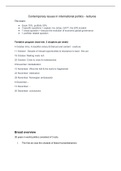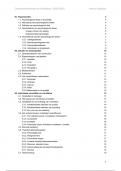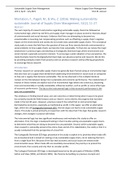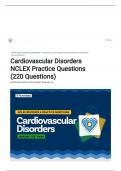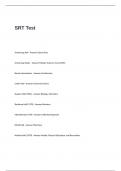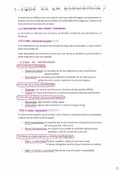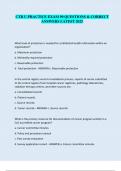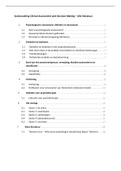The exam:
● Exam 70%, portfolio 30%
● 3 specific questions > explain: Hu Jintao, GATT, the EP3 incident
● 1 broad question > discuss the evolution of economic global governance
● 1 portfolio related question
Tentative program (read min. 2 chapters per week)
4 October Intro, A doubtful victory & Distrust and content - overture
11 October: Decade of missed opportunities & reluctance to lead - first act
18 October: Making rivals rich
25 October: Crisis to crisis & recklessness
8 November: Globalization
15 November: What the hell & the world is fragmented
22 November: Abdication
29 November: Norwegian ambassador
6 December:...
13 December:...
20 December: conclusions
Broad overview
30 years in world politics consisted of 3 acts.
I. The first act was the charade of liberal humanitarianism.
,The west exited the Cold War as the most powerful region. The unipolar order left other
countries no alternative partner, investor or security provider. The roots of discords, however,
were already present but the West ignored them.
Officials proclaimed moral superiority and vowed to change the morals of other countries
through trade. Trade was soon all that mattered.
Engagement, with its diplomatic dialogues and its summit meetings, was superficially preserved.
But the commitment to advance freedom disappeared.
The priority of the West was not to revitalize democracy and the free market, or to empower
citizens and entrepreneurs; its main priority was to empower consumption and corporate giants,
whatever the consequences in terms of financial instability, pollution and geopolitics.
Leaders like Tony Blair and Bill Clinton were masterful communicators, highlighting human
rights and social justice. Their main merit, though, was to give opportunism a friendly face.
China and the Gulf States showed that all they needed to do was t somewhat conceal their
distrust of the West, to keep the charade of engagement going, and to exploit its greed to grow
stronger.
II. The second act was a travesty of globalization.
In 2001 the Western world faced 4 important reality checks:
- The Dotcom bubble burst
- In this case, nothing was done to stop capital from creating new bubbles and to
turn the savings glut into an opportunity for building a sustainable, humane
economy at home.
- The terrorist attacks of 9/11
- In this case, the Bush admin. Embarked on a crusade, started 2 massive ill-
conceived military campaigns, tightened its relations with authoritarian leaders in
the Gulf, and stoked more anger in the Muslim world.
- The EP-3 spy plane incident between the US and China
- In this case, the US wrote a letter to say sorry and continued its stunted
engagement.
- The European Commission’s warnings that the newly established currency, the euro,
was imperiled by large government deficits.
- In this case, despite many indications of design flaws in the eurozone and
skepticism about enlargement, center parties continued their elastic run. What
, allowed them to igore the warning lights was a period of growth and surging
trade. Globalization, hence, came to be seen by some as a given, borders as a
relict. This was the period of the large E-CLass container ships, the double
decked Airbus 380, the first Iphone. During this time though, economic
globalization no longer coincided with the spreading of democracy.
Throughout the world, a new generation of strong leaders took the helm, happy to send more oil
and other goods to the West, yet increasingly determined to restrict its influence.
The Global South surfed on a wave of high commodity prices, and Chinese capital empowered
authoritarian leaders. At the same time, more cracks appeared inside the Western world.
III. The third act can be titled “redistribution and retreat”
Between 2010 and 2020 the West faced the consequences of 20 years of hubris and
complacency.
Cosmopolitan forces were confronted with the advance of rightist nationalists.
The neglect of the Global South, the false euphoria about the commodity boom, and the
devastating impact of environmental distress evolved into the spreading of political instability,
the propagation of terrorism, and migration pressure on societies that no longer felt confident.
As a result of 20 years of opportunism toward China, the latter saw the change to start a
pushback, economically and militarily.
The rise of China and the weakening of Western influence emboldened other regional powers:
Russia, Turkey, and Saudi Arabia.
They eagerly filled the power vacuum left by the West.
The refusal to retaliate against the Syrian government after having crossed the red line of using
chemical weapons against civilians was a milestone in that regard, and so were the frail
responses to Russia’s annexation of Crimea, the withdrawal of American troops from
Afghanistan after a humiliating treaty with the Taliban, and the lack of protest against the
incarceration of millions of Chinese Muslims.
The return of rude geopolitics and the growing appeal of strong leadership made politicians try
to keep up appearances instead of calling on citizens to support genuine reforms.
, Money was poured into the economy, but it hardly contributed to a new industrial revolution.
Leaders spoke tough against China and Russia but kept enriching them. They spoke of
sustainability, but kept accepting pollution if it could be turned into a competitive advantage.
Migrations were pushed back to unstable countries.
Then came Brexit and President Trump, who formally declared the end of the era of
globalization.
Overture
Chapter 1.
Outline:
- The weakening of the West
- The limits of globalization
- China VS the Global South
- Security


